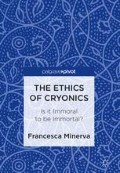Abstract
Cryonics is considered a key step towards indefinite life extension. But are there good reasons to extend the human lifespan beyond its current limit? One possible reason is that death is bad, and since death is bad, we should avoid dying by staying alive indefinitely. In this chapter, possible explanations for why death might be bad are examined. In particular, two accounts of the badness of death are considered in detail: death as deprivation of a future life and death as frustration of desires and preferences. These two accounts of the badness of death provide good reasons for considering death bad under certain circumstances (although not under all circumstances, such as when a life entails unbearable pain), yet leave open the question of whether immortality might be an even worse alternative.
Access this chapter
Tax calculation will be finalised at checkout
Purchases are for personal use only
Notes
- 1.
Given the limited scope of this book, I will leave aside non-Western cultures in which the influence of traditions like Hinduism and Buddhism have contributed to the development of a different approach to life and death.
- 2.
Many languages have an equivalent of the sentence “if my grandmother had wheels, she would be a cart”, a joke used to reply to someone fantasizing about hypotheticals in which the premises implies a scenario that is incompatible with the existence of the subject who is speaking (“If I were born in Ancient Greece” or “If my mother were Cleopatra”).
- 3.
I will consider conceivability the mere metaphysical possibility of something (I can conceive of a green horse, but I cannot conceive of a horse that is also a cabbage). I will consider possible something that is not merely conceivable, but also has some chances to happen (it is possible that a horse lives up to 50 years, although it has never happened). I will consider probable something that has quite high chances of happening (it is probable that a horse lives at least 20 years).
- 4.
For instance, Google co-founders Larry Page and Sergey Brin are among those who think indefinite life extension will probably be available within the next 20 years. See, for example, Friend (2017).
- 5.
This character was originally developed in a play by Karel Čapek, and later on adapted into an opera by Janacek.
References
Benatar, D. (2008). Better never to have been: The harm of coming into existence. Oxford University Press. Retrieved from https://market.android.com/details?id=book-paoVDAAAQBAJ
Fischer, J. M. (1994). Why immortality is not so bad. International Journal of Philosophical Studies, 2(2), 257–270. https://doi.org/10.1080/09672559408570794
Fischer, J. M., & Mitchell-Yellin, B. (2014). Immortality and boredom. The Journal of Ethics, 18(4), 353–372. https://doi.org/10.1007/s10892-014-9172-3
Friend, T. (2017, March 27). Silicon Valley’s quest to live forever. The New Yorker. Retrieved from https://www.newyorker.com/magazine/2017/04/03/silicon-valleys-quest-to-live-forever
Kahneman, D. (2011). Thinking, fast and slow. Macmillan. Retrieved from http://www.math.chalmers.se/~ulfp/Review/fastslow.pdf
McMahan, J. (1988). Death and the value of life. Ethics, 99(1), 32–61. Retrieved from https://www.ncbi.nlm.nih.gov/pubmed/11653818
Nagel, T. (1970). Death. Noûs, 4(1), 73–80. https://doi.org/10.2307/2214297
Williams, B. (1973). The Makropulos case: Reflections on the tedium of immortality. In B. Williams (Ed.), Problems of the self (pp. 82–100). Cambridge: Cambridge University Press. https://doi.org/10.1017/CBO9780511621253.008
Author information
Authors and Affiliations
Rights and permissions
Copyright information
© 2018 The Author(s)
About this chapter
Cite this chapter
Minerva, F. (2018). The Death Conundrum. In: The Ethics of Cryonics. Palgrave Pivot, Cham. https://doi.org/10.1007/978-3-319-78599-8_3
Download citation
DOI: https://doi.org/10.1007/978-3-319-78599-8_3
Published:
Publisher Name: Palgrave Pivot, Cham
Print ISBN: 978-3-319-78598-1
Online ISBN: 978-3-319-78599-8
eBook Packages: Social SciencesSocial Sciences (R0)

